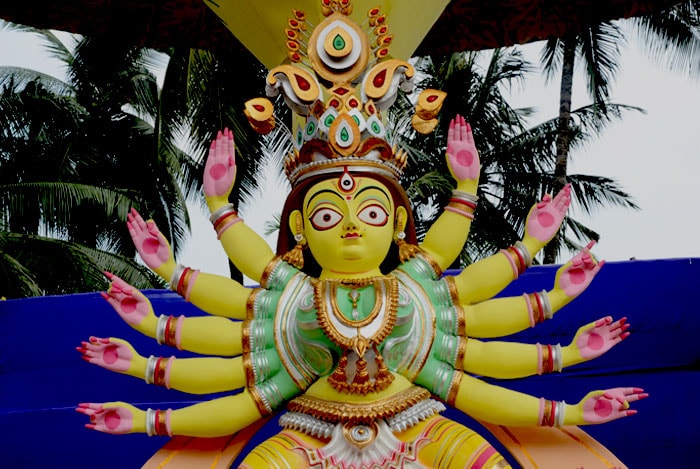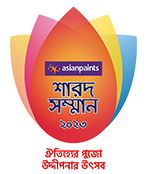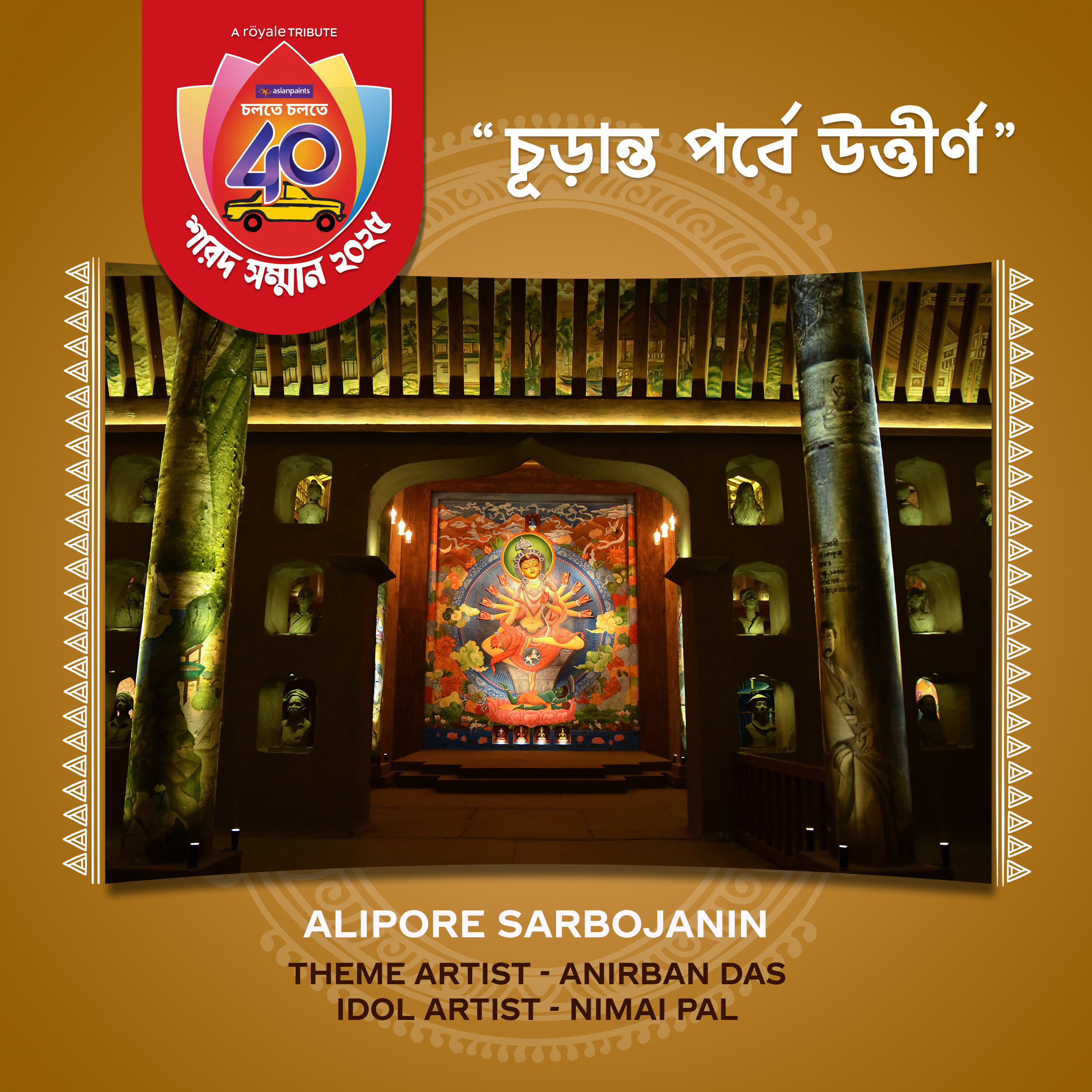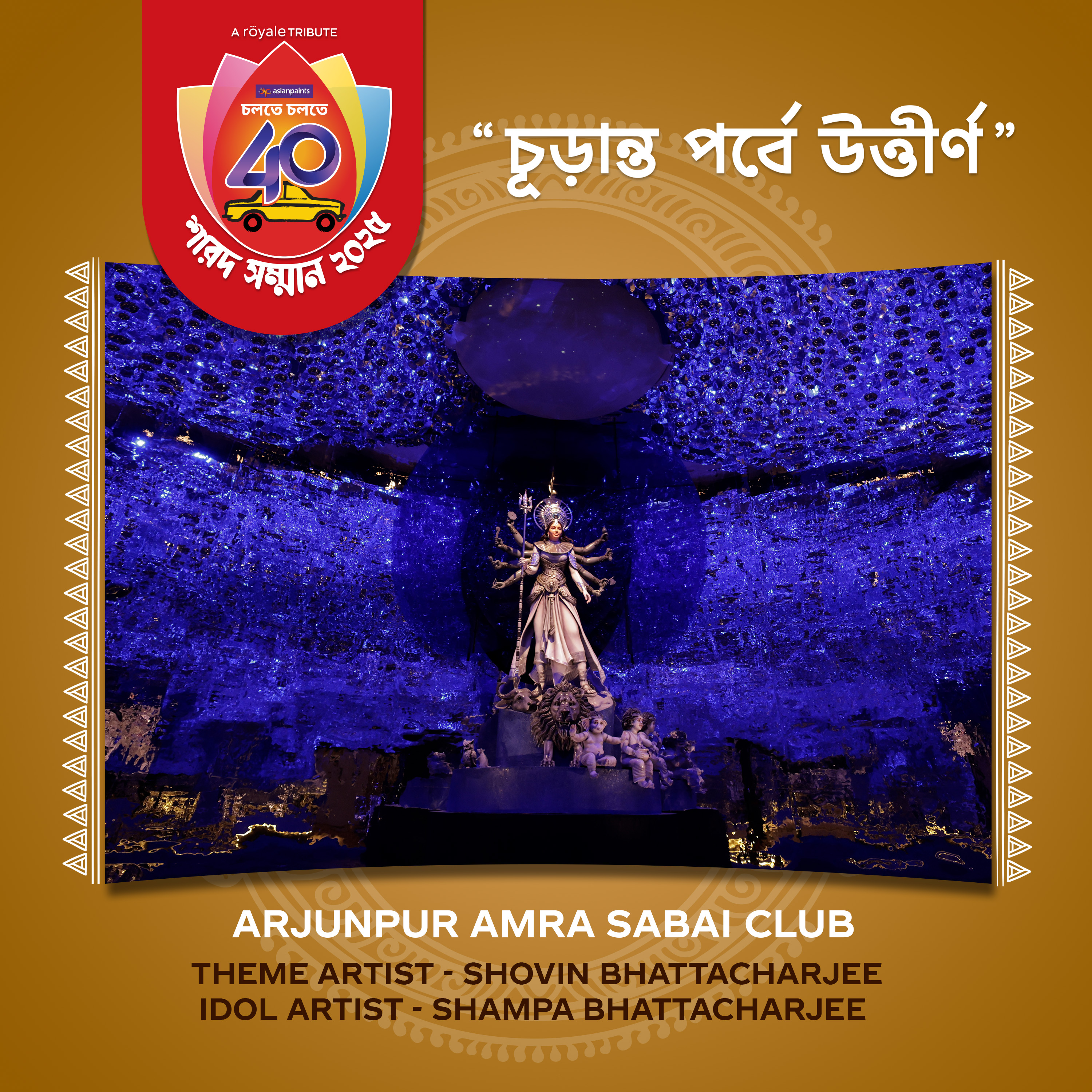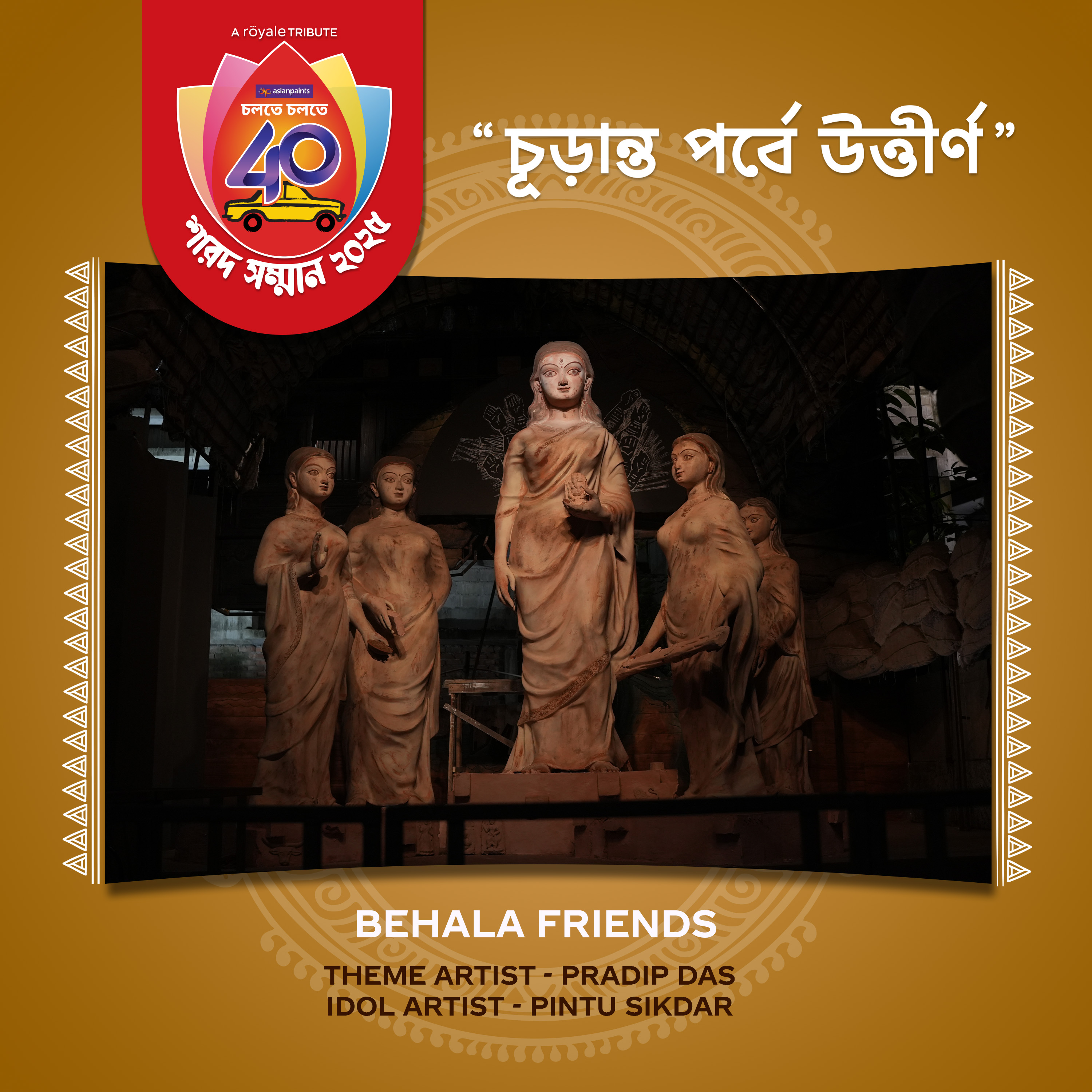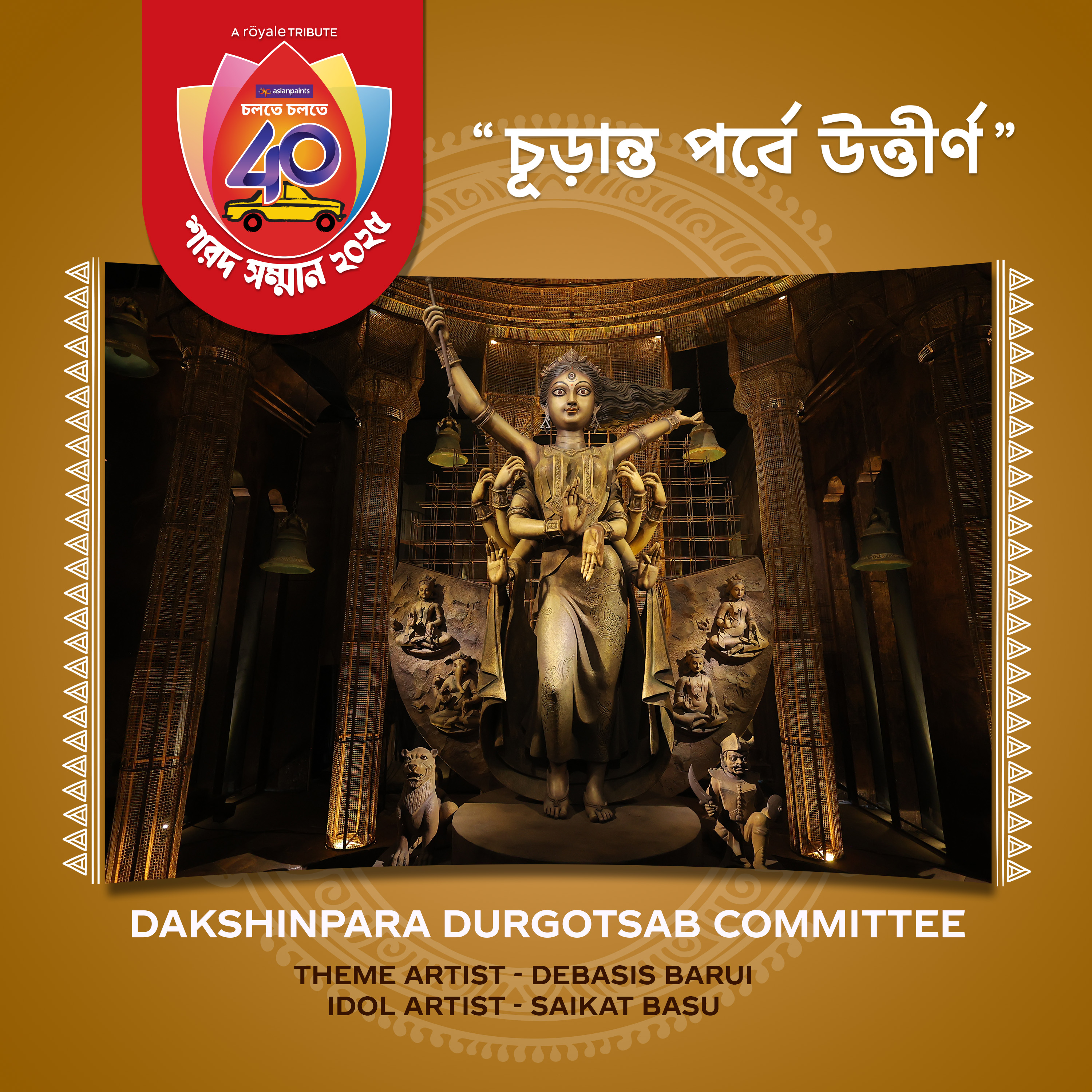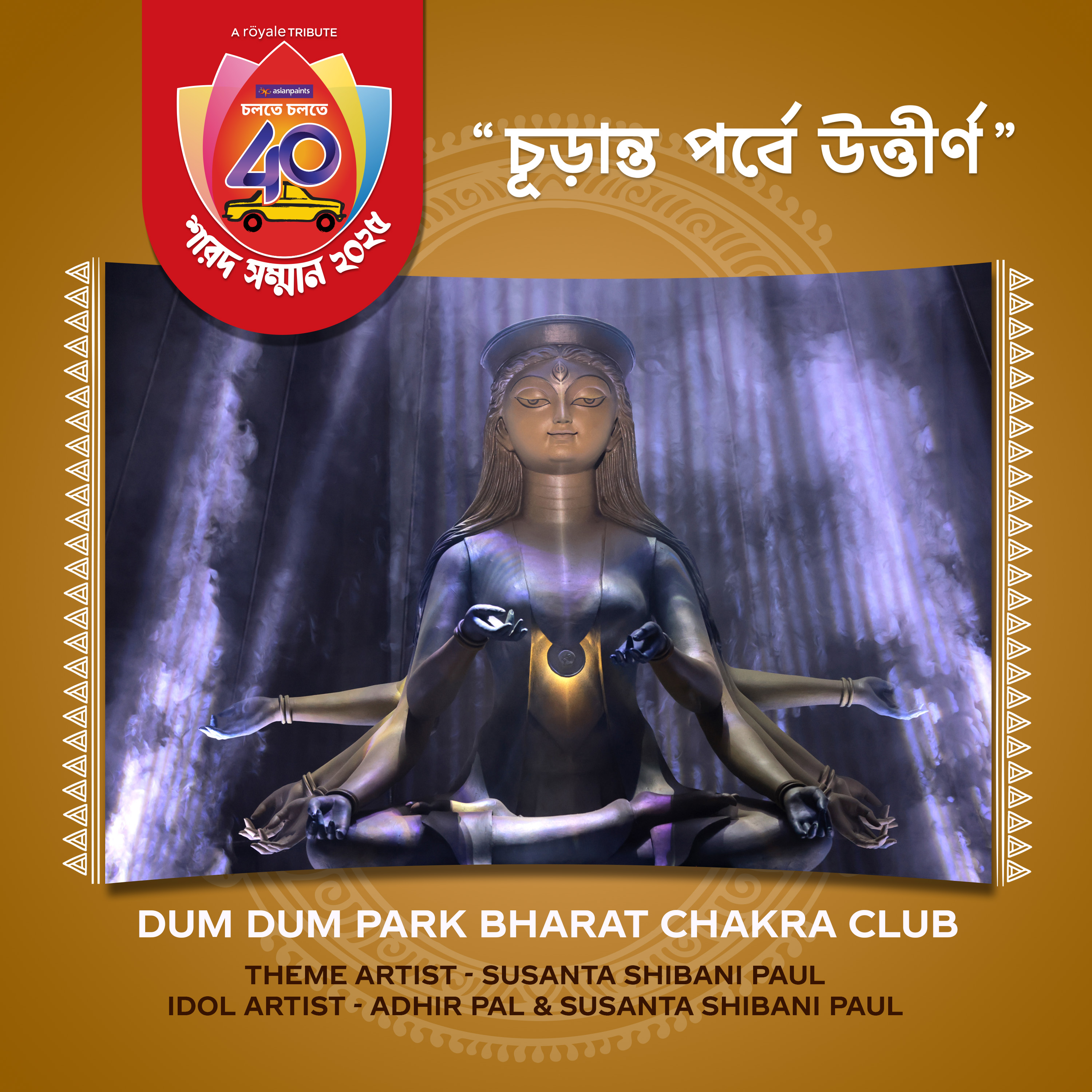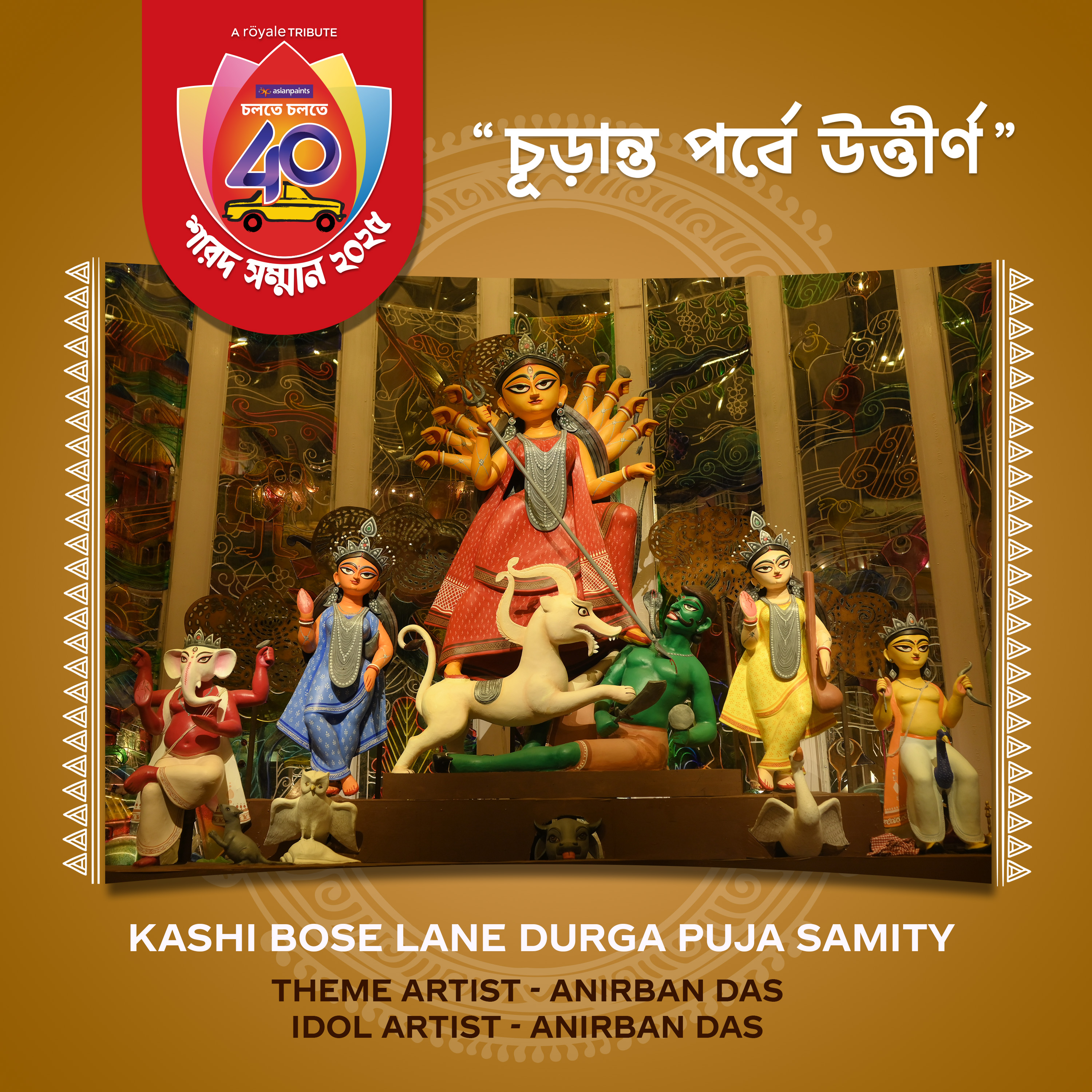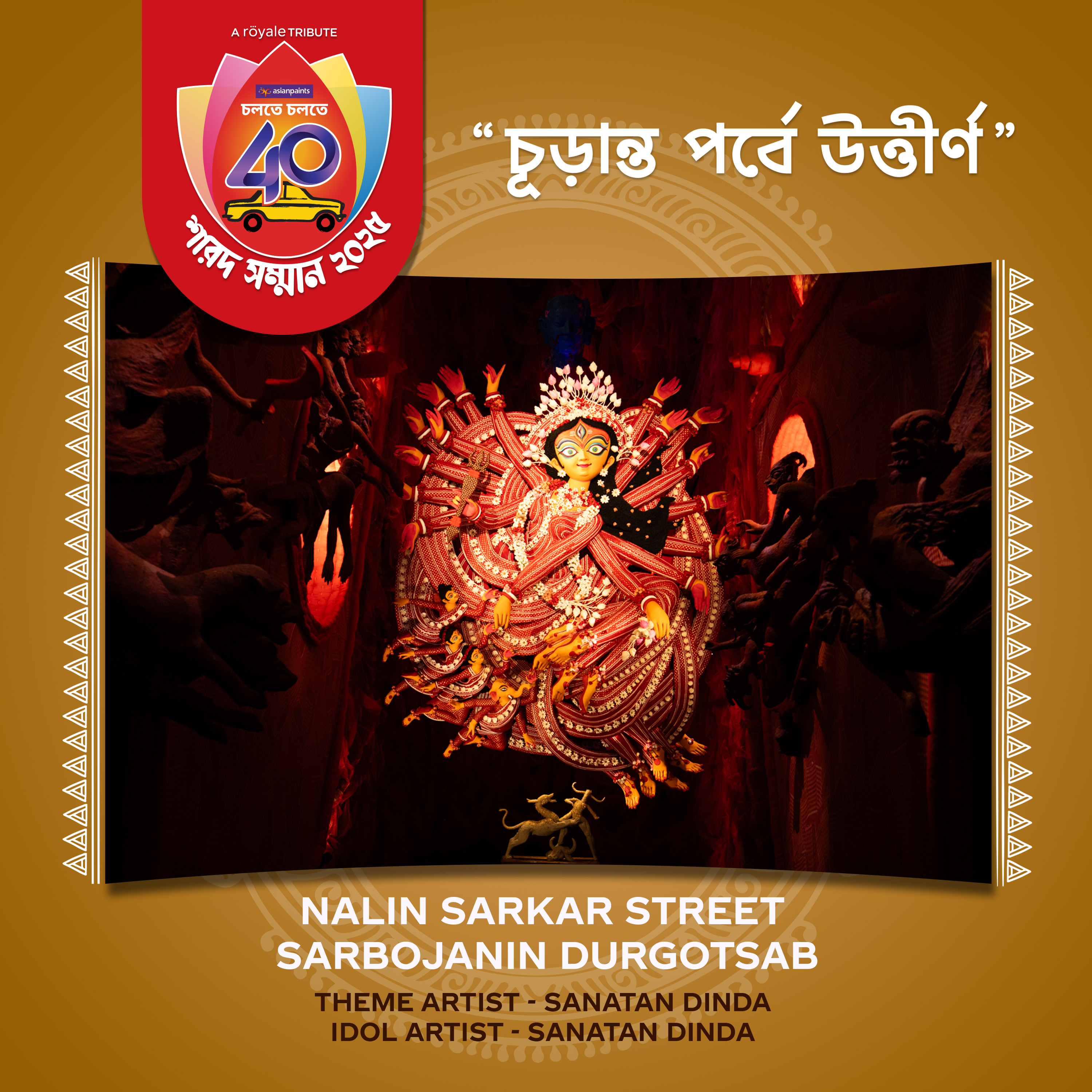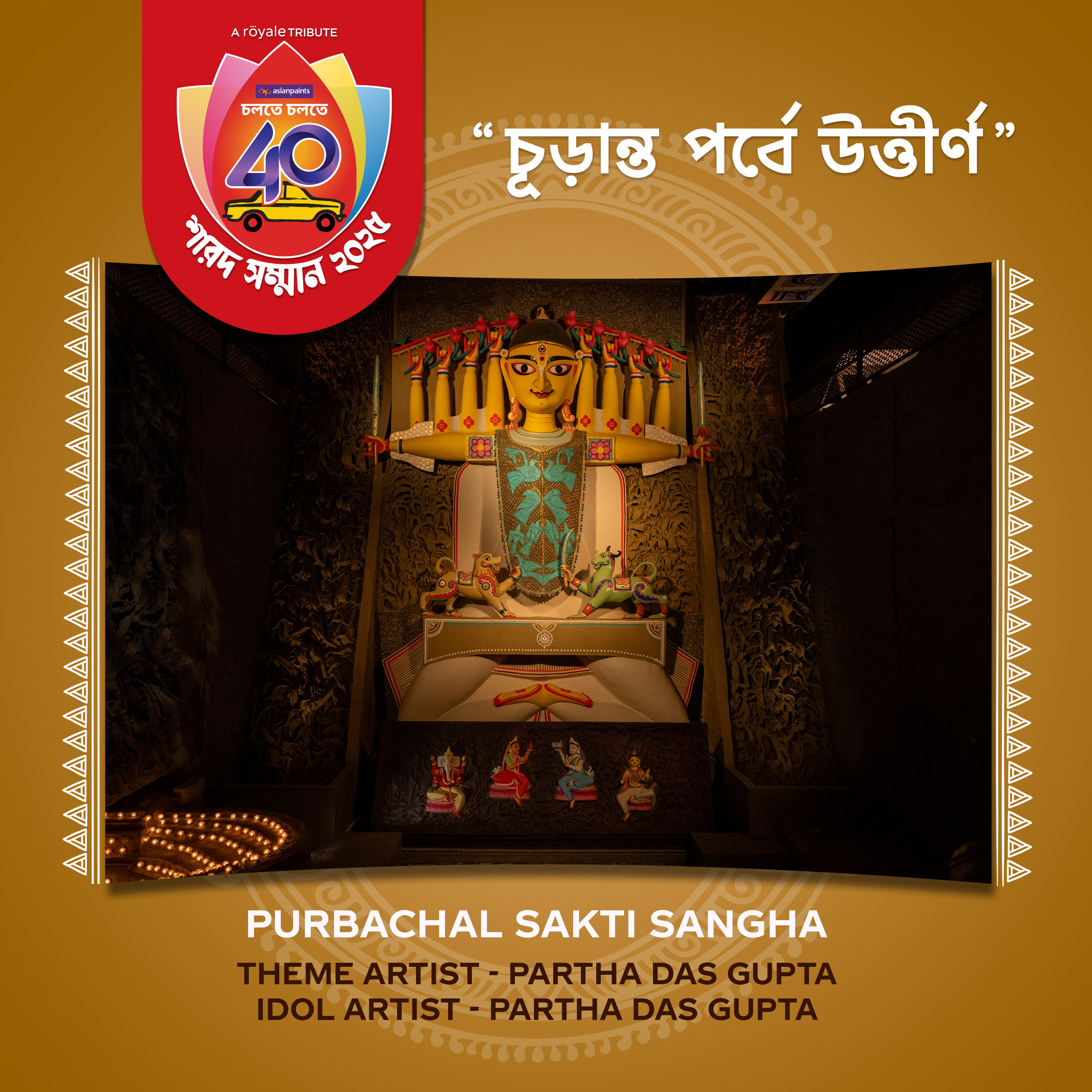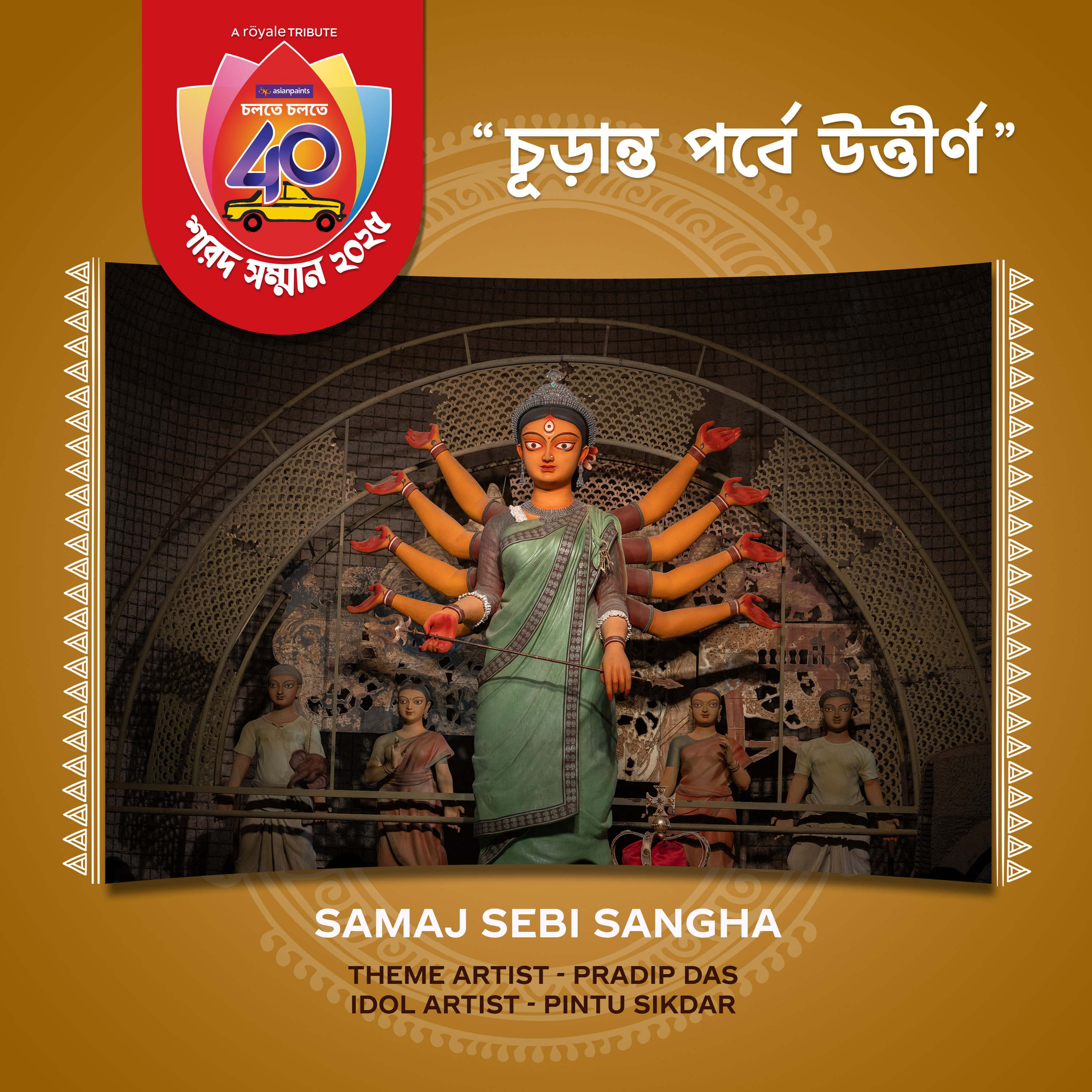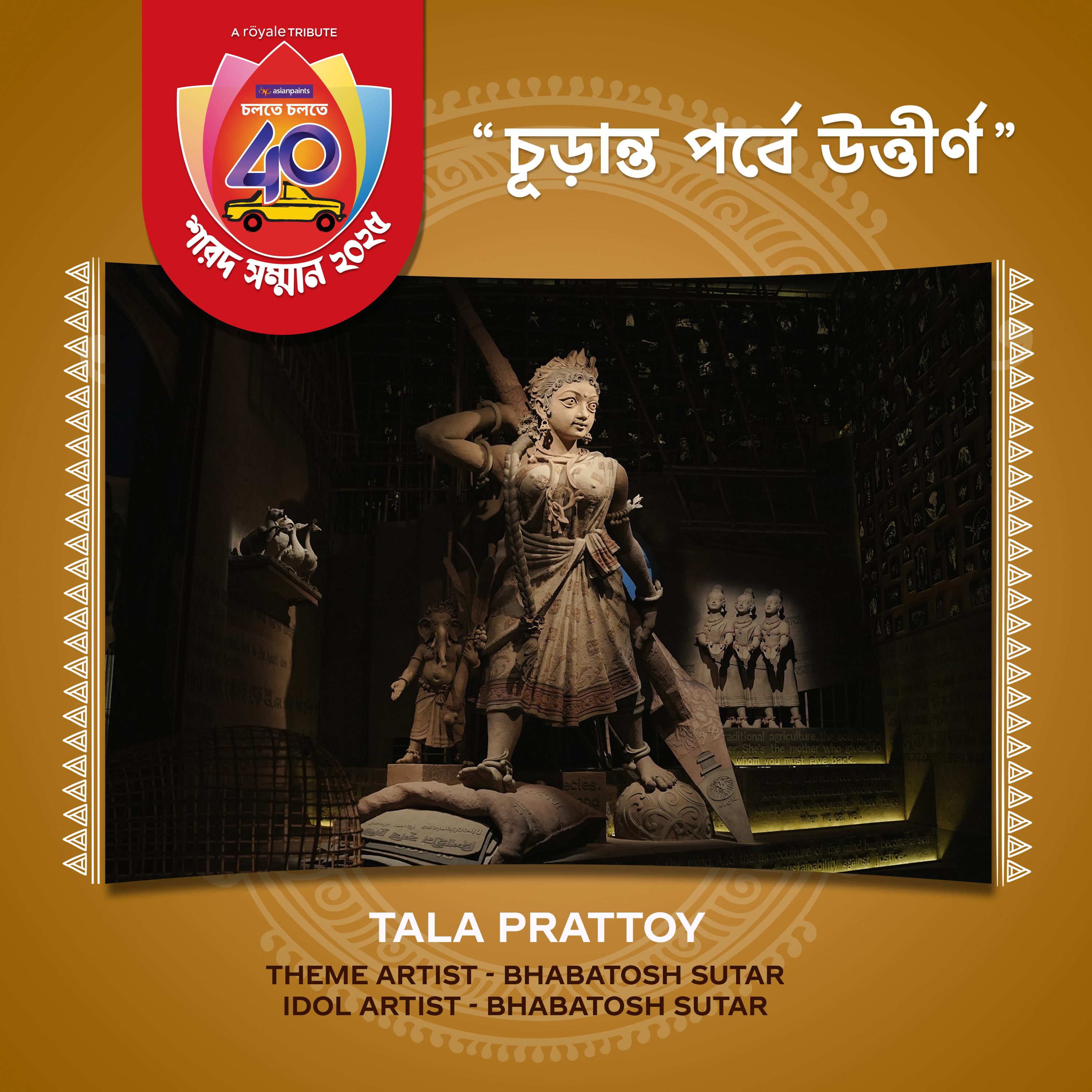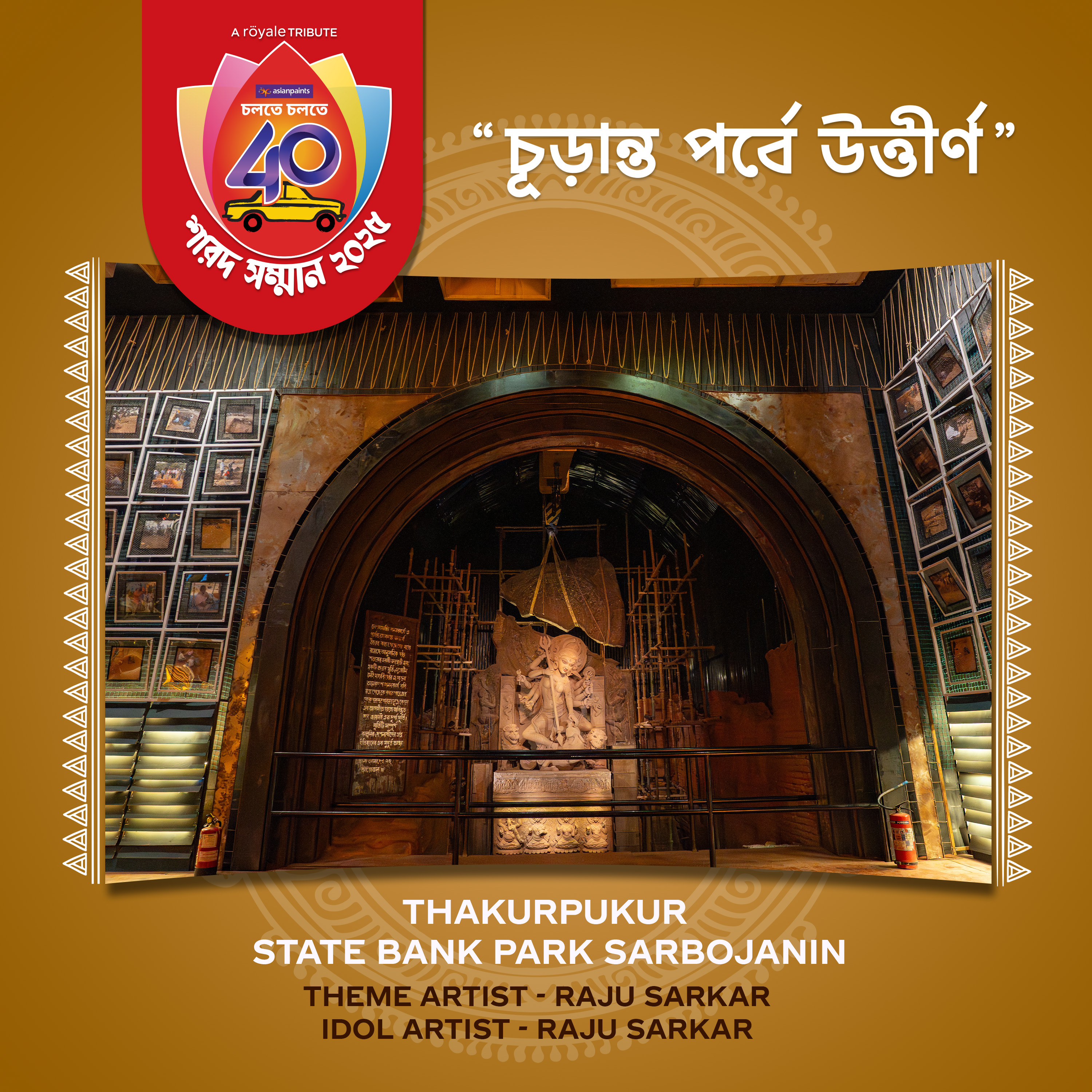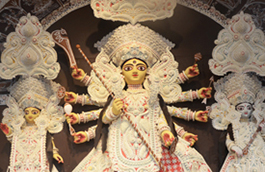Dugga Elo Ghawrey
APSS 2025
Alipore
Sarbojanin
Theme Artist :Anirban Das
Idol Artist : Nemai Pal
Theme : Cha-pan Utor
Tea is an element which carries numerous stories and knows no boundaries. It has seen struggles for freedom across countries, and that is indeed relevant to how Maa Durga defended the freedom of the devas. The theme has been brought to life with emerald tea gardens, amidst which stands the deity in the form of the daughter of the mountains. She is one among the workers and cradles Ganesha just like the others while picking tea leaves. She is a likeness of the fact that the extraordinary resides within the ordinary.
Arjunpur Amra Sabai
Club
Theme Artist : Shovin Bhattacharjee
Idol Artist : Shampa Bhattacharjee
Theme : Mukhomukhi (face to face)
In this pandal, the visitors are encompassed by the realm of reflection, where the vision is not only physical but also a step into self-realisation. Numerous installations have been placed tactfully to make humans understand that when they look deeper into themselves, the ego vanishes, thereby procuring a better version of themselves. The deity is a depiction of a woman who is given a pen instead of a trishul to indicate generational progress. Even the trinayan of the devi is luminous with the power of a pen, which is ultimately knowledge.
Behala
Friends
Theme Artist :Pradip Das
Idol Artist : Pintu Sikder
Theme : Nobanno
This puja pandal is a depiction of post-war devastation, where both the war of Palestine and the 1943 Monnontwor of Bengal have been shown along with the consequences. The visitors can see the ardent urge for three basic needs - food, shelter and clothes, and even the deity is struggling to thrive. She stands with her children amidst the aftermath, and strands of wheat (for food) and wood (for home) are all that is shown, since that is all that is needed for a human for survival.
Dakshinpara Durgotsab Committee
Theme Artist :Debasis Barui
Idol Artist : Saikat Basu
Theme : Probahi (The flow within)
Life is all about going with the flow, and the portrayal of human momentum in the din and bustle of daily life is exactly what has been shown by Dakshinpara this time. It is as if the visitors are performers themselves, and the flow of the crowd, despite all hindrances, aligns perfectly with the theme. There are two mechanical performers beside the goddess whose continuous up and down motions show the inevitable ritual between the dominant and submissive, and how time changed the roles of both. At first, Maa seems to be in a submissive state, but as soon as the crowd gets near, she secures her dominance over them, who represent the entities of the entire world.
Dum Dum Park Bharat Chakra Club
Theme Artist :Susanta Shibani Paul
Idol Artist : Adhir Paul & Susanta Shibani Paul
Theme : Tanmatro (the aura)
This year’s puja aims to understand and perceive not only the goddess but the aura that surrounds her. From the entrance itself, one can see spirals of lights fading into other geometrical patterns that show the luminosity of the devi and the tantrik way of devotion that resides between the light and dark phases. Hologram projectors have been used to show Mahakal and the ‘daiva chakra’ that many have wanted to explore. The goddess is mystical and in a meditative state herself- as if on her way to moksha.
Kashi Bose Lane Durga Puja Samity
Theme Artist :Anirban Das
Idol Artist : Anirban Das
Theme : Pakdondi (twisted path)
This theme has been inspired by the very life and works of the famous writer Leela Majumdar, and the theme name is truly justified by the twisted path amidst the Pine trees in her stories. The houses around the pandal have been painted with the cover pages of her books, and there is a crossword puzzle with the names of her works. An easy chair has been placed with manual kinetic installation to portray relaxation, and a gap has been created with butterflies, clouds and other props to show how a child’s mind works. The entire space, along with the deity, seems to have propped right out of a children’s storybook.
Nalin Sarkar Street Sarbojanin Durgotsab
Theme Artist :Sanatan Dinda
Idol Artist : Sanatan Dinda
Theme : Rupantor (transformation)
Change is the only constant in life, and when the daily road that we tread on seems bland, it is time to change it to something vibrant. The entire pandal is inspired by kothasahityo and carved out of a childish dream. The background music is a tribute to 100 years of Salil Chowdhury, and even the deity stands unique with eighteen hands instead of ten. It is as if she is dancing with her children after Mahishashur has been destroyed and only love and happiness linger instead of fear.
Pratapaditya Road Tricone Park
Theme Artist :Deep Das & Eshika Chandra
Idol Artist : Saikat Basu
Theme : Debdarshan
In the earlier days, the deity or the temple was only secured for the elites, and none but they could enter the garbhagriha. But that is exactly the prejudice that has been shattered by Raja Ravi Verma, who took up the task of painting the gods and goddesses and bringing them into the homes of common people. The pandal has a Kerala style courtyard and one can see the first press machine with the advertisement of ‘The Birth of Shakuntala’- one of his finest creations. Even Maa Durga, along with her children, seems to reflect his portraits and a fulfilment of his desire to create the deity for all.
Purbachal Sakti
Sangha
Theme Artist : Partha Das Gupta
Idol Artist : Partha Das Gupta
Theme : Mathkhodai Kathkhodai
Human life is immovable without the use of maati (soil) and kath (wood). This theme, therefore, uses the works of various artisans who have skilled themselves in carving beautiful structures of wood, and the usage of wooden landscaping creates a bridge between humans and natural resources like wood and soil. Maa Durga oversees the process of this creation and smiles as the talent of these artisans is brought out of the galleries into the open world to witness.
Samaj Sebi Sangha
Theme Artist :Pradip Das
Idol Artist : Pintu Sikder
Theme : Pather Panchali (1946)
Samaj Sebi started its puja way back in 1946, right after the riot, and the theme is their interpersonal storyline. The pandal is a showcase of communal harmony and the attempt that the people during those times took to bring back a state of normalcy. This year’s pujo will be the beginning of the creation of a model street with art deco homes. The deity is embracing the euphony with ten hands, and she is in command of bringing a better tomorrow, one without violence and riots.
Tala Prattoy
Theme Artist : Bhabotosh Sutar
Idol Artist : Bhabotosh Sutar
Theme : Beej Angan (Seed Courtyard)
In this world of utter toxicity, even the farmlands and seeds have been ruined with the use of pesticides. The poison that is poured into the earth is the asur here, and the goddess is a simple farmer’s daughter who is fighting to protect her grounds organically. In the entrance, one can behold an enormous seed in the shape of a human brain, surrounded by barcodes. This, along with numerous live performances in every corner, is a clear depiction of how, just like the seed, humans are filled to the brim with toxins, and the degradation of the farmers with every passing day.
Thakurpukur
State Bank Park Sarbojanin
Theme Artist : Raju Sarkar
Idol Artist : Raju Sarkar
Theme :Protnokotha
Away from the ultra-modernism of city life, a remote village of Medinipur brought up parts of Buddha Bihar in an excavation, and this theme has been inspired by the same. The deity of Buddhism, inspired by Saraswati, dating back 1500 years, is what invoked the creation of Maa Durga this time, and her historic look is in sync with the decor that seems to be the site of the excavation itself. It is an archaeological presentation in a modern metro city, which is quite an irony.
Discovery of the year 2014
